Why US Workers Don't Take Sick Leave (2023 Data)
American workers have a sick leave problem—they’re not using it, even when they’re sick. Nearly all US workers (89%) have worked through an illness in the last year, and close to half (46%) acknowledge they probably shouldn’t have.
The Centers for Disease Control (CDC) estimates that nearly 1 in 5 Americans who have had COVID-19 now struggle with chronic long COVID symptoms. Yet American sick time policies foster a climate of suspicion and surveillance. In the last 12 months, 1 in 4 workers (25%) has been pressured or explicitly asked to work despite being sick.
In comparison to the rest of the world, American paid sick leave policies are falling behind. Of the 193 UN member states, only 4 countries don’t guarantee some form of paid sick leave for workers: the United States, India, Somalia, and South Korea. Today, the US only guarantees unpaid sick leave.
“The remote situation post-COVID-19 has made [managing sick leave policies] worse," says Anita Grantham, BambooHR’s Head of HR. "You can be at home and still be on work calls. But working when ill doesn't serve the person, the company, or the customer.”
To find out why employees feel so guilty about taking sick leave—and how HR policies can help or hurt—we surveyed 1,565 full-time US officer workers, including 500 HR managers.
Read on to discover how workers handle working and being sick, what they experience from managers and coworkers, and what they expect from their organization.
Key Takeaways
- In the last 12 months, 89% of workers have worked through sickness.
- One in seven (15%) say they work every time they’re sick.
- 64% of workers experience negative emotions when requesting sick time, including stress, anxiety, guilt, or fear.
- 1 in 4 workers (25%) have been pressured or explicitly asked to work while sick.
- 73% of workers agree that no one needs to know the exact reason why you’re taking a sick day.
- 40% of workers say they feel insecure taking sick time because they think others assume they’re faking it.
- Overall, younger workers face more challenges around sick leave and sickness. In the last year:
- 68% of Gen Z employees have taken a sick day for mental health reasons.
- 93% of Millennials have worked despite being sick.
- Nearly two-thirds of workers (63%) think it’s their employer’s responsibility to mandate a work culture that allows unquestioned sick leave.
Nearly 90% of Employees Work Through Sickness—Or Feel Guilty When Calling out of Work
Between the pervasive stress around requesting sick time and pressure to work while sick, it’s not surprising the majority of Americans are going to work sick.
In the last 12 months, 89% of workers have worked through a sickness—one in seven (15%) say they work nearly every time they’re sick.
How Often Have You Worked Through a Sickness in the Last 12 Months?

This may be due to a lack of adequate paid sick leave. In 2022, the Bureau of Labor and Statistics reported that 77% of private industry workers have access to paid sick leave—leaving close to one-quarter of workers without any paid sick time.
For many, sick leave also feels like an ordeal rather than a benefit. Two-thirds of workers (64%) experience negative emotions when calling out of work.
How Do You Feel While Requesting Sick Time?
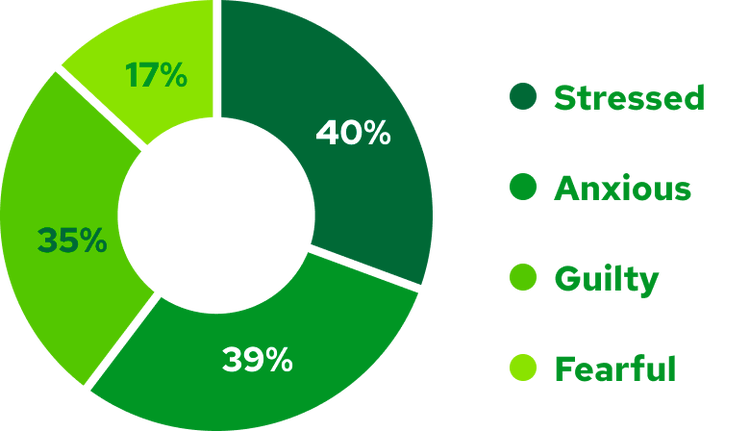
Half of workers (50%) say they only experience negative emotions when requesting sick time.
Even when people have access to more expansive sick leave policies, the guilt sticks around. 40% of workers say they feel guilty if they aren’t physically sick—even though their company includes sick leave in a general wellness policy.
Employees face another issue: Their sick requests aren't always honored. In the last year, 1 in 4 workers (25%) has been pressured or explicitly asked to work despite being sick.
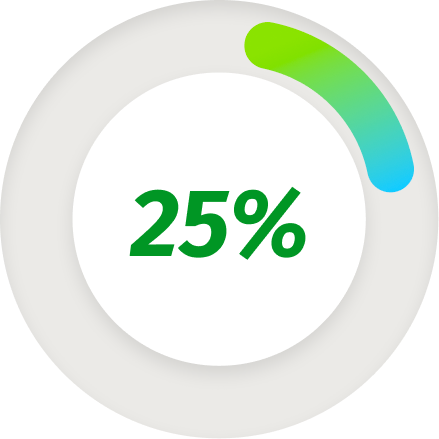
HR Spotlight
HR professionals feel the pressure to work more acutely. Compared to other workers, they're even more likely to feel bad about calling out of work:
- 93% have worked while sick in the last 12 months.
- 57% only ever experience negative emotions when requesting sick time.
Advice for HR Professionals
Culture change starts from the top, so to change the way people feel or act around sick leave, leaders need to model the behaviors they want to see in their workforce.
Get your leaders on board by making a business case for a more positive, supportive attitude toward employee wellness. Use HR analytics to tell a persuasive, human story about what you're seeing in your workforce and how it’s impacting the business.
For example, HR managers can report on talent turnover and retention rates, sick days taken, absence rates, and the financial cost associated with each.
75% of Employees Say Sick Time Rules Are Left Unspoken
Employees look to company sick leave policies for reassurance—they want to know what PTO they can use, for what reasons, and who’s responsible for making the final decision.
Ultimately, US workers want clear PTO policies that allow for unquestioned sick leave, with nearly two thirds (63%) saying it’s their employer’s responsibility to mandate such a work culture.
However, workers’ lived reality is quite the opposite. In fact, 75% of employees say their company has unspoken rules about using sick time.
Satisfaction with Available Paid Sick Time

We found that unlimited PTO that includes sick time is the most popular policy, with 85% of employees reporting satisfaction. Other popular policies include:
- Sick time with general wellness included (84%)
- Sick time and vacation time combined (79%)
The least popular policy limits paid sick leave strictly to physical illness, but 76% of employees still say they would be satisfied with this arrangement.
High satisfaction doesn’t completely solve workers' anxiety around sick leave. Among workers whose workplace offers a general employee wellness policy, 40% still feel guilty taking time when they aren’t physically sick.
40% of Employees Don't Believe in a One-Size-Fits-All Sick Leave Policy
More than half of employees (60%) prefer equal sick time across the board, no matter the circumstances.
But 40% of workers think certain employees should receive more sick time than others, including:
- Pregnant employees (29%)
- Employees with disabilities (23%)
- Senior staff (15%)
- Parents (13%)
- Caregivers (13%)
- Newer employees (2%)
Additionally, 1 in 5 workers (19%) feel their available sick leave isn't appropriate to their position and tenure.
HR Spotlight
HR professionals differ from other workers, expressing a more nuanced view of sick leave depending on individual circumstances.
- Only 48% of HR pros think all employees should receive an equal amount of sick time.
- Of these, 35% think pregnant employees and 24% think senior staff should qualify for more.
Advice for HR Professionals
Nearly 4 in 5 Managers Have Been Skeptical of Sick Day Requests
Most managers (77%) have suspected a sick-day faker on their roster. For some, the skepticism is well-earned: 43% of workers have taken at least one sick day when they weren’t actually physically sick in the last 12 months.
HR professionals appear to be even harsher: 82% of HR managers have suspected someone they manage isn’t actually physically sick when calling out.
Ironically, more HR pros (51%) say they’ve taken a sick day in the last 12 months when they weren’t actually sick.
Have Taken a Sick Day Without Physical Symptoms

Underlying this conflict is a lack of regulatory clarity. In the US, federal laws provide little guidance on what employers can—and can’t—ask when their employees take sick days.
In 2023, the only federal regulations that touch on this issue are the Family and Medical Leave Act (FMLA), Americans with Disabilities Act (ADA), and Health Insurance Portability and Accountability Act (HIPAA) Privacy Rule.
● General wellbeing
● If they can perform their job duties
● Applies to prospective or current employees
● Disability-related questions
● Applies to prospective or current employees
● Proof of their (or family member’s) medical condition
● Applies to the employee or eligible family member
If you ask employees whether managers should be able to pry into why they're calling out of work, the answer is clear. 73% of workers agree—no one needs to know the exact reason why you’re taking a sick day.
Yet nearly 1 in 5 workers (18%) say they've had a manager, coworker, or HR pry for details when they’re trying to take sick leave.
Advice for HR Professionals
Your organization can raise the bar and defy employees' negative expectations. Create explicit policies on what your managers can and can’t ask when an employee takes sick days.
To help you create time off policies that work for your particular workforce, here are some questions to think about:
- What unique needs do your employees have?
- Does your industry place certain limits on those needs (e.g., you have specific open hours that require in-person staff)?
- What kind of policies will best reflect and align with your organizational values?
Employees' Insecurity Fuels a Culture of Judgment Around Sick Leave
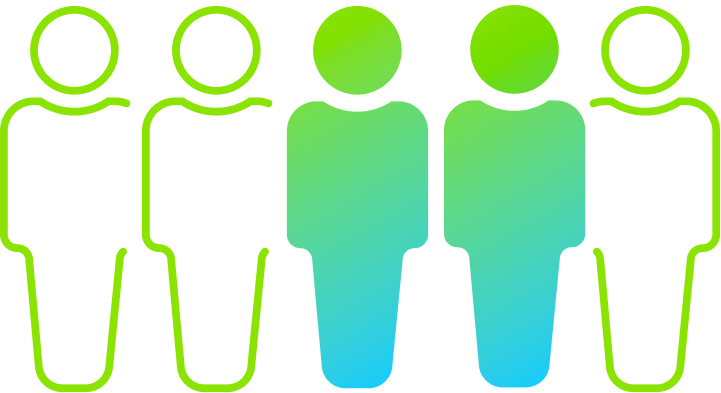
Employees’ tendency to work while sick, their anxiety when requesting sick time, and managers suspecting them of faking it all reinforce an unhealthy culture around sickness and work.
Possibly picking up on their managers' suspicions, two in five workers (40%) feel insecure taking sick time because others may assume they’re faking it.
This insecurity is well founded. In addition to skeptical managers and HR, people also face their colleagues’ judgment and disapproval.
One-third of workers (32%) say they've been upset at coworkers for using sick time for reasons other than physical illness—compared to just 25% who are frustrated when coworkers come in when sick.
More than one-third of workers (35%) say it’s inappropriate for a new employee to take sick leave during their first month on the job.
Older workers are more likely to have strong feelings about their colleagues' use of sick leave. 36% of Boomers say they're upset when a coworker takes a sick day without being physically ill, compared to 32% of Gen X, 32% of Millennials, and 27% of Gen Z.
This culture of judgment and surveillance can pressure workers to bring contagious symptoms into shared office spaces. In the last 12 months, 2 in 5 workers (41%) say they’ve seen a coworker working when they should’ve taken a sick day.
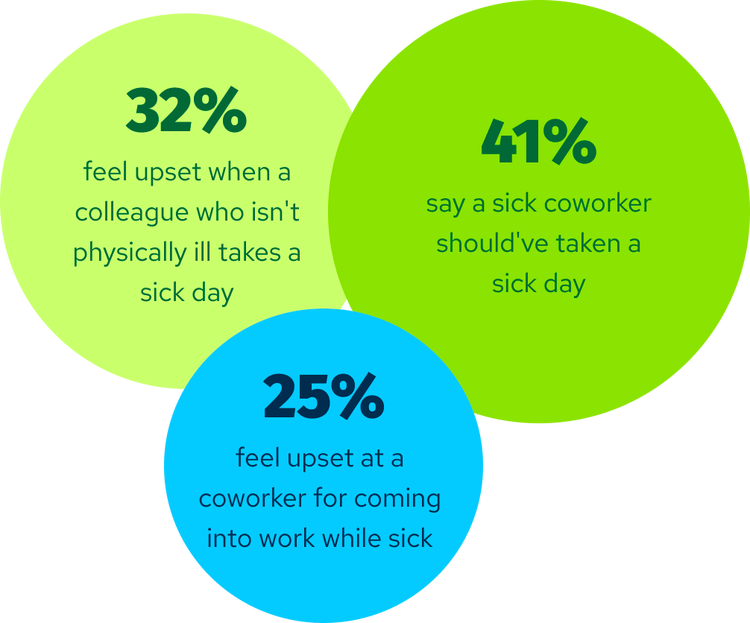
For 47% of Employees, Sick Leave Includes Mental Health
Close to half of US workers (47%) use sick leave to cope with mental health challenges.
Workers also cited burnout, as well as depression or anxiety, as leading reasons they'd consider calling out of work. The most common justifications for a sick day include:
What Are the Most Common Reasons for Taking Sick Time?
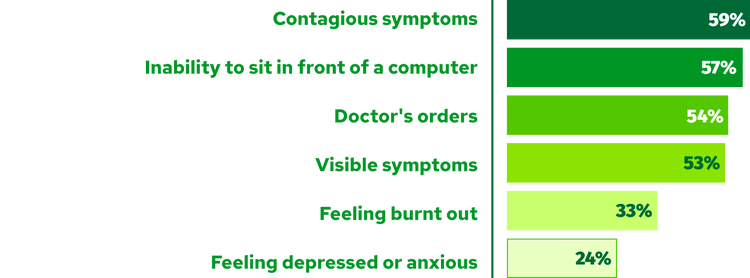
HR Spotlight
HR professionals aren’t as likely to take time off when experiencing symptoms but are more likely to take a sick day for mental health needs.
- Only 77% of HR pros say they’d take a sick day if they were experiencing symptoms, compared to 91% of other employees.
- 55% of HR pros have taken a sick day for mental health needs in the last year, compared to 43% of other employees.
Workers' Worries About Workload Often Outweigh Their Health Concerns
When considering whether to power down or push through, workers’ number one consideration is their workload. Nearly half of the workers (47%) said their workload influences their decision to use sick leave—more than any other option, including physical symptoms.
Taking time off isn’t a simple choice for employees. The vast majority (90%) of workers have a mental checklist they go through when deciding whether they can take sick time off work, including:
- How much work do I have to do today? (47%)
- How sick am I, really? (44%)
- Can my coworkers cover for me? (35%)
- Could I power through until the weekend? (35%)
- Will people think I'm lying? (22%)
- Will my manager support this request or bother me even if I take a sick day? (21%)
- Will I get in trouble? (19%)
- Could I lose my job? (17%)
- How much do I like my job? (11%)
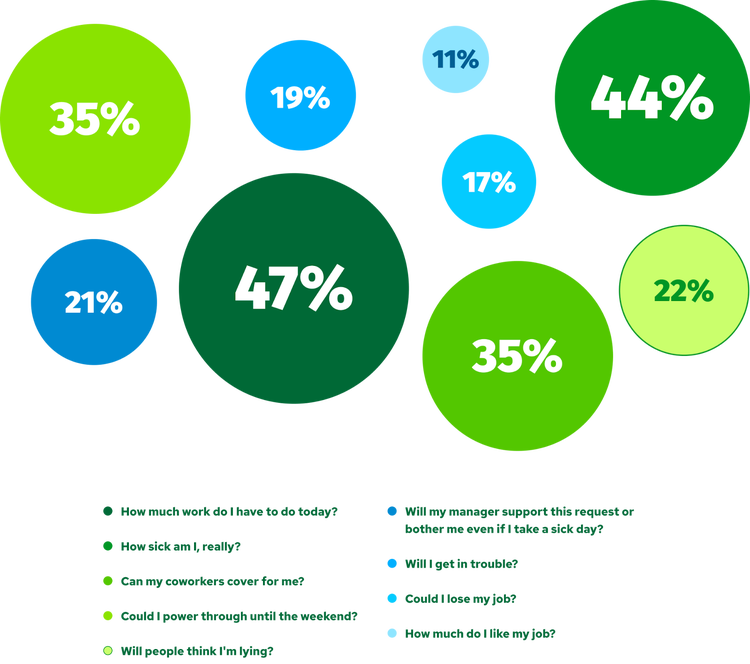
What's on the hiring horizon for 2023?
We surveyed 1,500 full-time workers, including 500 human resources professionals, to find out how they feel about hiring and employee retention in 2023. Read the full report to find out what employees expect from employers, how they're coping with financial stressors, and more.
Younger Employees Are More Likely to Work Through Sickness
Whether it’s a matter of seniority, work experience, or time off accrual, younger workers seem more sensitive to the pressure to work while sick and the stigma surrounding taking time off for sickness.
Overall, Gen Z is more self-conscious of how much sick time they use. 22% of Gen Z employees say they use more sick leave than their colleagues, compared to 10% of Millennials and Baby Boomers, and just 6% of Gen X employees.
Compared to older workers, younger generations are also much more likely to work when they’re sick:
Use More Sick Time Than Colleagues

Work While Sick

Reflecting national trends on mental distress, Gen Zers lead all generations in taking sick days for their mental health. More than two-thirds of Gen Z employees (68%) have used sick time for mental health in the last 12 months, followed by 54% of Millennials.
By contrast, just 38% of Gen X and Boomer employees say they've used sick leave for mental health.
Have You Taken a Sick Day for Mental Health Reasons in the Last 12 Months?

Some of this may be related to how people in different stages of life experience stress. In the American Psychological Association’s Stress in America 2022 report, close to half of adults under age 35 (Gen Z and Millennials) feel so stressed they can’t function. Only 16% of adults aged 45 to 64 reported feeling the same level of stress.
Another reason may be generational attitudes toward mental health. Gen Z and Millennials are more likely to seek help for mental health issues, according to the CDC.
Millennials Face the Most Pressure to Work While Sick
Overall, Millennials get the shortest end of the stick when it comes to sick guilt. 93% of Millennials—more than any other generation—have worked through sickness in the last 12 months.
This trend occurs alongside Millennials' reports that they are pressured—or explicitly instructed—to work while sick. Nearly 2 in 5 Millennials (38%) say their employer has pushed them to power through, more than Baby Boomers (21%), Gen X (22%), or Gen Z (20%).
Nearly half of Millennials (47%) feel insecure taking sick time because they think others assume they’re faking it, compared to 35% of Boomers and 33% of Gen X.
Pressured or Explicitly Asked to Work While Sick
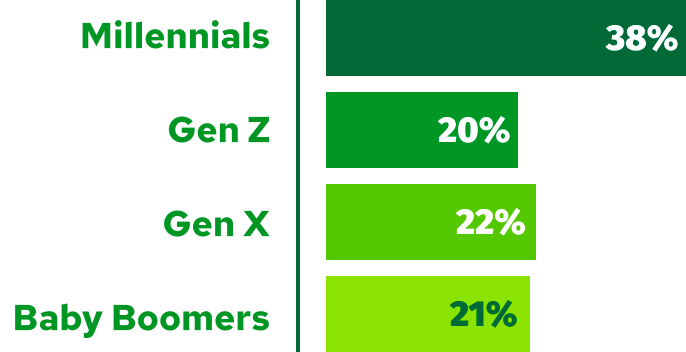
Advice for HR Professionals
HR professionals can have a positive impact by encouraging more employees to care for their mental health. Cassie Whitlock, BambooHR’s HR Director, points to people’s perception of mental health as a common roadblock. “There’s been progress, but people still stigmatize mental illness.”
Her recommendation: “Do whatever you can to create psychological safety and normalize mental health at the personal level. Tell stories, encourage anyone who’s used the EAP to share their experience, and create spaces where employees can share those experiences comfortably.”
“The more people hear about something from trusted sources, the less they’ll feel uniquely challenged and unsure,” Cassie emphasizes.
ABOUT BAMBOOHR
BambooHR brings together everything from hire to retire, helping businesses create amazing workplaces. With our complete HR platform, you can easily hire, onboard, manage time, payroll, and benefits, analyze employee data, and more. Our mission is to set you free to focus on what matters most: your people. To find out more, visit bamboohr.com or follow @bamboohr on social media.
METHODOLOGY
BambooHR conducted this research using an online survey prepared by Method Research and distributed by RepData among 1,500 adults age 18 and over in the United States who are full-time office or knowledge workers. Among the sample, 500 respondents are in an HR functional management role. The sample was equally split between gender, with a spread of age groups and geographies represented, and readable race groups. Data was collected from December 19, 2022 to January 4, 2023.
Mastering Performance Management
Rather watch than read? Sit back and enjoy our popular video series on what it takes to master performance management at your company.
How HR Professionals Can Manage Employee Benefits in a Post-Pandemic World
Take a look at some tools and strategies to help you identify, measure, and prioritize the benefit expectations of your current and future workforce.
BambooHR Performance Management
Wondering how to improve your productivity processes? See what effective performance management software looks like up close.